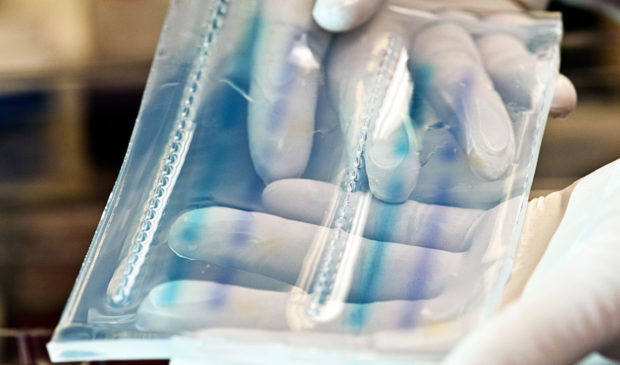By outsourcing, APD has made major progress on sex assault kit backlog
Tuesday, December 12, 2017 by
Jack Craver The Austin Police Department’s embarrassing backlog of sexual assault kits will hopefully soon be a thing of the past.
APD told members of the Public Safety Commission Monday that there are 856 kits from the backlog left to be analyzed, down from more than 2,165 in February and more than 4,000 when the police department’s forensics lab was shut down in June of last year after state auditors found major problems in how evidence was being handled.
“I don’t think any of us anticipated that (much progress) a year ago,” said commission Chair Rebecca Webber.
None of the analysis has been done by APD, but rather the four different entities to which the department has outsourced the work: Signature Science, an Austin-based analysis company; Sorenson Forensics in Salt Lake City, Bode Cellmark in Virginia and the Texas Department of Public Safety, which has been running the APD lab since March, when the city agreed to pay it $800,000 a year to revive the shuttered lab.
DPS also agreed to help retrain six APD lab technicians, but in December announced that it was giving up on four of the technicians due to “significant challenges that impact confidence in the work product” of those employees.
In remarks to the Public Safety Commission, Lynn Garcia, general counsel of the Texas Forensic Science Commission, said the state agency was taking important steps to prevent similar situations in the future. Beginning in 2019, for instance, the state will begin licensing forensic scientists, ensuring that those entrusted by local law enforcement to analyze sensitive criminal evidence will have a certain amount of training.
It remains unclear what form a future APD lab may take, including whether it will operate within or separate from the police department.
Also helping the city and county develop a long-term solution for DNA analysis is John Holloway, executive director of the University of Pennsylvania’s Quattrone Center for the Fair Administration of Justice. The city and Travis County have jointly hired the center to conduct a “root cause analysis” to figure out what went wrong at the APD lab.
The investigation, which Holloway predicted would take nine to 10 months, will focus on identifying the systems that failed, rather than finding somebody to blame.
“It’s a completely different answer to the problem than you’d usually get from an administrative review or a performance review … where all you’re looking for is who’s responsible for this,” he said.
According to the contract authorized by City Council in October, Holloway’s task is to “identify options and make recommendations on the optimal organizational structure, staffing, training and leadership” for a local DNA lab.
Part of that process will be interviews with those involved in the former DNA lab as well as a variety of others connected to the process, said Holloway, noting that he will not have subpoena power to compel cooperation.
Commissioner Kim Rossmo, a former Vancouver police officer who now teaches criminal justice at Texas State University, suggested Holloway interview members of the commission.
“I would like to be interviewed,” said Rossmo.
Rossmo also prodded Holloway on how independent his investigation would be from the police department, the city and the state forensic science commission.
Holloway said that his aim was for the process to be collaborative and “driven by the stakeholders.” He noted, however, that the center was getting paid by the city and Travis County, which are splitting the costs of the contract evenly.
Also speaking to the commission was Trudy Strassburger of the Capital Area Private Defender Service, which over the past six months has been working on “finding those people who should never have been convicted due to unreliable DNA evidence,” according to its website.
Bruce Budowle, a world-renowned forensic scientist at the University of North Texas, is individually reviewing cases “where the DNA may have led to a different outcome,” Strassburger said.
Photo by University of Michigan School for Environment and Sustainability made available through a Creative Common license.
The Austin Monitor’s work is made possible by donations from the community. Though our reporting covers donors from time to time, we are careful to keep business and editorial efforts separate while maintaining transparency. A complete list of donors is available here, and our code of ethics is explained here.
You're a community leader
And we’re honored you look to us for serious, in-depth news. You know a strong community needs local and dedicated watchdog reporting. We’re here for you and that won’t change. Now will you take the powerful next step and support our nonprofit news organization?



